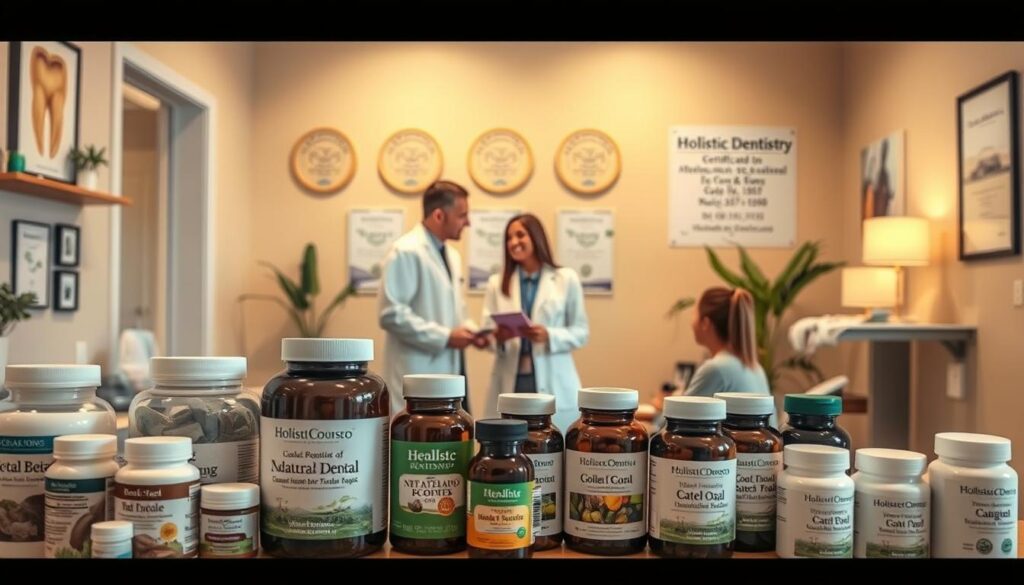As I explore the complex world of dental care, I’m often asked about the relationship between holistic dentistry and insurance coverage. Many people are drawn to this alternative approach to oral health, which focuses on natural remedies and overall health.
Dentists who practice holistic dentistry often combine traditional methods with alternative treatments. But what does this mean for insurance coverage? I’ll examine the intricacies of insurance policies and how they relate to dental care.
Key Takeaways
- Understanding insurance coverage for holistic dental treatments requires examining traditional dental insurance policies.
- Some holistic dental procedures may be covered by conventional insurance plans.
- The holistic approach to dentistry differs from conventional methods, impacting insurance coverage.
- Patients should be aware of the financial aspects of holistic dental care.
- Navigating insurance coverage can help patients make informed decisions about their oral health.
Understanding Holistic Dentistry
Understanding holistic dentistry requires exploring its core principles and how they impact health. Holistic dentistry is a comprehensive approach that considers the intricate relationship between oral health and the whole body. This dental care philosophy is grounded in the understanding that health is not confined to the mouth alone.
What Is Holistic Dentistry?
Holistic dentistry is practiced by dentists who view oral health as an integral part of overall health. These professionals focus on treating the entire person, not just the symptoms. They use non-toxic materials and minimally invasive procedures to promote oral health and overall well-being.
The practice involves a range of techniques, from mercury-free fillings to ozone therapy, aimed at maintaining a healthy balance between the mouth and the body’s systems.
The Mouth-Body Connection
The mouth-body connection is a fundamental principle in holistic dentistry. It refers to the undeniable fact that your oral health and whole-body health are interconnected. For instance, research has shown that gum disease can be associated with various systemic conditions, including diabetes and Alzheimer’s. This connection works vice versa, where the presence of systemic diseases can impact oral health.
| Oral Health Condition | Associated Systemic Conditions |
|---|---|
| Gum Disease | Diabetes, Alzheimer’s, Heart Disease |
| Oral Infections | Respiratory Infections, Pregnancy Complications |

Holistic vs. Traditional Dentistry: Key Differences
The divergence between holistic and traditional dentistry is rooted in their fundamentally different views on health and treatment. While traditional dentistry focuses on treating the symptoms and often involves procedures like root canals, holistic dentistry considers the overall well-being of the patient and the potential systemic effects of dental treatments.
Treatment Philosophy Differences
Holistic dentists approach dental care with a focus on the mouth-body connection, believing that oral health affects overall health. In contrast, traditional dentists often focus on treating the tooth or gum issue directly. For instance, holistic dentists tend to avoid root canals due to concerns about potential systemic infections.
Materials Used in Treatments
The materials used in dental procedures also differ significantly. Holistic dentists prefer biocompatible, metal-free materials to minimize toxicity, whereas traditional dentists may use a broader range of materials, including metals. This difference is particularly notable in fillings and implants.
Approach to Common Dental Procedures
When it comes to common dental procedures, holistic and traditional dentists have different approaches. For example, instead of performing root canals, holistic dentists might recommend extracting the tooth and replacing it with a biocompatible implant. For cavity treatment
By understanding these differences, patients can make informed decisions about their oral health care, weighing the benefits of preserving natural teeth against concerns about potential toxicity.
Common Holistic Dental Treatments and Procedures
In holistic dentistry, dentists use a variety of procedures to address dental issues while considering the patient’s overall health. This approach focuses on treating the whole person, not just the symptoms.
Mercury-Free Fillings
One of the key treatments in holistic dentistry is the use of mercury-free fillings. Traditional amalgam fillings contain mercury, a toxic substance that can have adverse health effects. Holistic dentists opt for alternative materials like composite resin or glass ionomer, which are safer and more biocompatible.
Fluoride-Free Options
Holistic dentistry also offers fluoride-free options for patients concerned about fluoride exposure. Instead, dentists may use fluoride-free toothpaste or apply non-fluoride varnishes to protect teeth.
Ozone Therapy
Ozone therapy is another treatment used in holistic dentistry. It involves applying ozone gas to dental procedures or infected areas to promote healing and reduce bacteria. This method is particularly useful for treating root canals and gum disease.
Biocompatibility Testing
Biocompatibility testing is crucial in holistic dentistry, ensuring that materials used in dental procedures are compatible with each patient’s unique biochemistry. This involves testing various dental materials to prevent adverse reactions and ensure the best outcomes for patients undergoing dental procedures or other procedures.
Is Holistic Dentistry Covered by Insurance?
Understanding the nuances of insurance coverage is crucial for those seeking holistic dental care. Most dental insurance plans cover basic procedures such as twice-yearly dental checkups and imaging. However, the coverage for holistic dentistry can be more complex.
Types of Insurance That May Cover Holistic Dentistry
Some insurance plans may cover certain aspects of holistic dentistry, but it largely depends on the type of insurance and the specific holistic treatments involved. For instance, some plans may cover mercury-free fillings, but the coverage might be limited to the cost of amalgam fillings, leaving patients to pay the difference for the biocompatible materials used by holistic dentists.
To find a holistic dentist who accepts your insurance, you may need to research dentists within your network who practice holistic techniques. You can also search for “mercury-free” or “fluoride-free” dentists.

Common Coverage Limitations
There are several limitations to be aware of when seeking holistic dental care. Many insurance plans have limitations on coverage for alternative materials and procedures. For example, dental procedures like ozone therapy and biocompatibility testing are rarely covered as they are considered alternative or experimental.
- Many insurance plans limit coverage for alternative materials, requiring patients to pay the difference out-of-pocket.
- Specialized holistic procedures are rarely covered by conventional dental insurance.
- Insurance companies often impose frequency limitations on dental procedures like professional cleanings or x-rays.
| Coverage Aspect | Typical Insurance Coverage | Holistic Dentistry Considerations |
|---|---|---|
| Basic Procedures | Covered | Usually aligned with holistic practices |
| Alternative Materials | Limited Coverage | Patients may need to pay the difference |
| Specialized Procedures | Rarely Covered | Considered experimental or alternative |
To navigate these limitations, it’s essential to confirm what services are covered by your insurance before undergoing treatment with a holistic holistic dentist. Getting written proof of coverage can help avoid unexpected costs.
Costs of Holistic Dental Treatments
Holistic dental treatments often come with a higher upfront cost compared to traditional dentistry. This is primarily due to the use of more biocompatible materials and techniques that, while more expensive initially, can lead to longer-lasting results and fewer complications over time.

Average Costs for Common Procedures
The costs associated with holistic dental treatments can vary widely depending on the procedure. For instance, composite fillings, which are commonly used in holistic dentistry, may cost 30-50% more than amalgam fillings used in traditional dentistry. However, these fillings bond to the tooth structure, potentially preventing future fractures and the need for more extensive procedures like crowns.
Other treatments, such as ozone therapy and biocompatibility testing, are also frequently used in holistic dentistry. While these procedures may add to the initial cost, they are part of a preventive approach that can reduce the need for more costly interventions in the future.
Comparing Costs with Traditional Dentistry
When comparing the costs of holistic dentistry to traditional dentistry, it’s essential to consider both the initial expenses and the long-term financial implications. Traditional dentistry often follows a “stepped” approach, starting with a filling, potentially followed by a larger filling, a crown, a root canal, and eventually extraction and implant. In contrast, holistic dentists tend to favor more definitive initial treatments that, while potentially more expensive upfront, can reduce the need for repeated procedures and minimize the risk of complications.
For example, a traditional dentist might recommend a filling for early decay, adopting a “watch and wait” approach. In contrast, a holistic dentist might opt for immediate intervention using minimally invasive techniques, potentially reducing long-term costs for patients. Additionally, holistic practices often include comfort measures for anxious patients, which can add to the initial cost but may reduce the need for emergency treatments down the line.
- Holistic dental procedures often have higher upfront costs.
- The use of biocompatible materials can lead to longer-lasting results.
- A preventive approach can reduce the need for future, more costly interventions.
- Comparing costs between holistic and traditional dentistry requires considering both initial and long-term expenses.
Potential Long-Term Savings with Holistic Dentistry
As I explore the world of holistic dentistry, it becomes clear that this approach can lead to significant long-term savings for patients. Holistic dentistry focuses on preventive care and addressing the underlying causes of dental issues, rather than just treating the symptoms.
Preventative Approach Benefits
A key aspect of holistic dentistry is its preventative approach. By using minimally invasive techniques and focusing on the health of the tooth and surrounding tissue, holistic dentists can help patients avoid costly procedures like root canals. For example, a conservative approach to cavity treatment can prevent the need for more complex treatments.
The use of biocompatible materials also plays a crucial role in preventing adverse reactions and the need for future corrective treatments. This proactive approach can lead to significant cost savings over time.
Avoiding Costly Future Procedures
Holistic dentistry often involves addressing the root cause of dental problems, such as diet or stress-related issues, rather than just treating the symptoms. This approach can help patients avoid the cycle of repeated treatments. For instance, a holistic dentist might focus on correcting issues like tooth grinding or acid erosion, which can reduce the need for future tooth restorations or extractions.
| Procedure | Traditional Dentistry Cost | Holistic Dentistry Approach | Potential Savings |
|---|---|---|---|
| Root Canal | $1,000-$1,500 | Prevention through holistic care | $1,000-$1,500 |
| Tooth Extraction and Replacement | $500-$3,000 | Biocompatible materials and preventive care | $500-$3,000 |
| Cavity Treatment | $200-$500 | Minimally invasive techniques | $100-$300 |

How to Find Insurance That Covers Holistic Dental Care
Understanding how to find insurance that covers holistic dental care is vital for patients who want to make informed decisions about their oral health. Many biological dentists do not accept insurance, which can limit options for patients seeking holistic care.
Questions to Ask Insurance Providers
When searching for insurance that covers holistic dental care, it’s essential to ask the right questions. Patients should inquire about coverage for specific treatments like mercury-free fillings and ozone therapy. They should also ask about any limitations or exclusions in the policy.
- What holistic dental treatments are covered under the plan?
- Are there any specific dentists or practices that are preferred or excluded?
- What are the out-of-pocket costs for holistic dental services?
Alternative Payment Options
For patients who cannot find suitable insurance, there are alternative payment options available. These include Health Savings Accounts (HSAs) and Flexible Spending Accounts (FSAs), which allow patients to use pre-tax dollars for qualified expenses.
| Payment Option | Description | Benefits |
|---|---|---|
| HSAs | Health Savings Accounts | Tax-advantaged savings for medical expenses |
| FSAs | Flexible Spending Accounts | Pre-tax dollars for qualified medical expenses |
| In-house Membership Plans | Discounts on services for an annual fee | Cost-effective for committed patients |
Finding a Qualified Holistic Dentist
To ensure you’re receiving the best holistic dental care, it’s essential to evaluate potential dentists carefully. A qualified holistic dentist can provide a more comprehensive approach to oral health.
Credentials to Look For
When searching for a holistic dentist, look for dentists with specialized training in holistic dentistry. They should have a deep understanding of the mouth-body connection and use biocompatible materials.
- Check for certifications from reputable organizations.
- Review their experience with holistic methods.
Questions to Ask Before Your First Appointment
Before scheduling your first appointment, ask potential dentists about their methods and philosophy. Inquire about their approach to common procedures and the materials they use.
- What is your philosophy regarding the mouth-body connection?
- Do you use mercury-free fillings and fluoride-free options?
- How do you approach preventive care and patient education?
By asking the right questions, you can find a holistic dentist whose dentistry practice aligns with your health values and expectations.
Conclusion: Making Informed Decisions About Holistic Dental Care
Holistic dentistry presents a unique approach to oral health, emphasizing the connection between the mouth and the body. As patients consider this approach, it’s crucial to weigh the benefits and limitations.
The growing interest in holistic dentistry reflects a broader shift toward integrative healthcare. However, patients should approach this field with both an open mind and healthy skepticism, recognizing that insurance coverage for holistic procedures has improved but may still involve out-of-pocket expenses.
Maintaining good oral hygiene practices, following a healthy diet, and scheduling regular dental check-ups remain fundamental to long-term oral health, regardless of the chosen dental approach. By becoming active participants in their dental care decisions, patients can make informed choices that respect their health values and concerns.
Ultimately, the choice between conventional and holistic dentistry isn’t necessarily binary; many patients benefit from a combined approach that incorporates the best aspects of both philosophies, potentially leading to better overall health outcomes.
